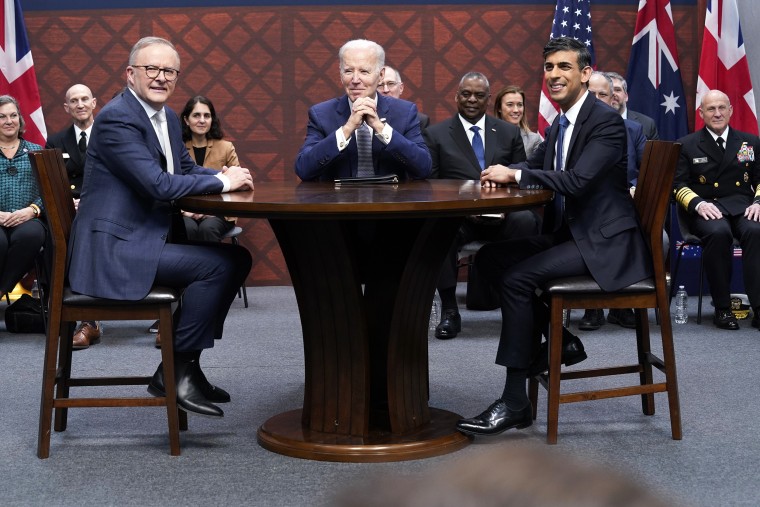WASHINGTON — The heads of the U.S., the United Kingdom and Australia announced an agreement Monday that would provide Australia with conventionally armed nuclear-powered submarines.
"Together we will deliver SSN-AUKUS — a trilaterally-developed submarine based on the United Kingdom’s next-generation design that incorporates technology from all three nations, including cutting edge U.S. submarine technologies," President Joe Biden, U.K. Prime Minister Rishi Sunak and Australian Prime Minister Anthony Albanese said in a joint statement.
"Australia and the United Kingdom will operate SSN-AUKUS as their submarine of the future," the announcement said.
Before the submarine will be ready for deployment in the early 2040s, the U.S. will sell Australia up to five nuclear-powered Virginia-class submarines in the 2030s, pending congressional approval, the statement said.

National security adviser Jake Sullivan told reporters that the deal is "a multiphase process that begins over the next few years and begins immediately with the training of Australian sailors, engineers, technicians and other personnel to be able to take on the responsibility and stewardship of nuclear propulsion."
The alliance with the three countries — known as AUKUS — was first announced in September 2021, and it was aimed at increasing cooperation on military defense, cyberthreats and supply chain security in the Indo-Pacific. Officials have said the move wasn’t aimed at any one country, but it has widely been seen as a way to counter China’s military buildup in Asia.
Speaking alongside his counterparts in San Diego, Biden said, “AUKUS has one overriding objective — to enhance the stability of Indo-Pacific amid rapidly shifting global dynamics.” He said the deal will help ensure the area remains “free and open, prosperous and secure.”
In an interview with NBC News on Sunday, Sunak said, “The behavior that we’ve seen in China over recent times is concerning.”
“China represents the biggest state threat to our economic interests, for sure. And it’s a systemic challenge for the world order,” he said.
When the partnership was first announced, Chinese Foreign Ministry spokesman Zhao Lijian said the pact “seriously undermined regional peace and stability, exacerbated the arms race and undermined international nuclear nonproliferation efforts.”
In their joint statement Monday, the three leaders stressed the submarines would be conventionally armed and said their plan "reflects our longstanding leadership in, and respect for, the global nuclear nonproliferation regime."
“Australia is a proud nonnuclear weapons state and is committed to stay that way. These boats will not have nuclear weapons of any kind,” Biden said in his remarks.
Asked whether China had been told about the announcement ahead of time, Sullivan said, "We have directly engaged with China to explain to them what AUKUS is, and what it is not."
He called the partnership "a model for how a country can be transparent and predictable in trying to contribute to peace and security and to safeguard that peace and security in the Indo-Pacific."
Dan De Luce reported from Washington and Dareh Gregorian from New York.
